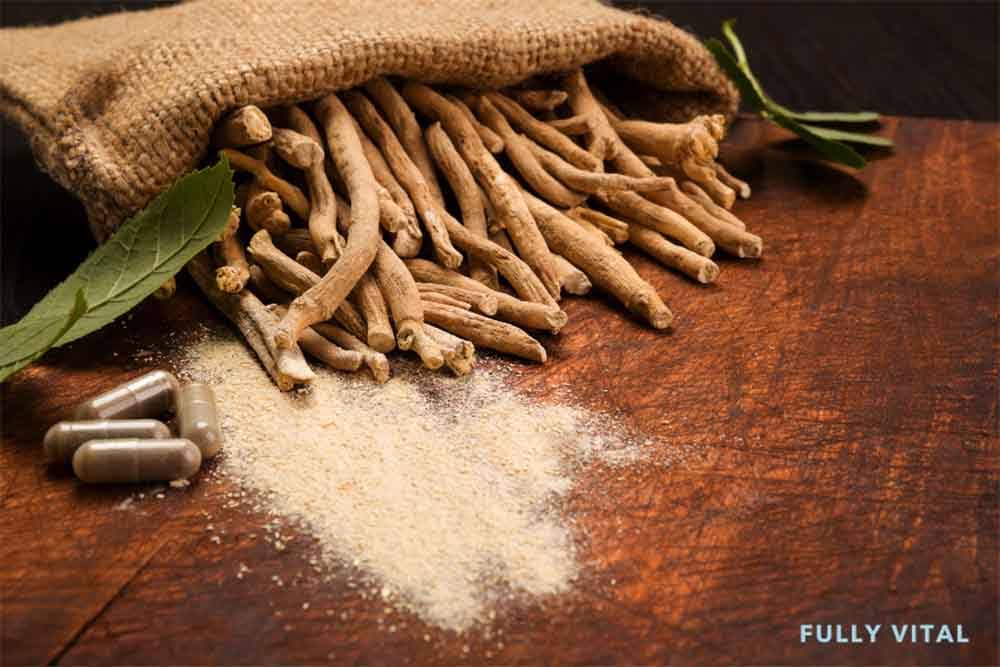
Ashwagandha And Hair Loss: What You Need To Know Before Taking This Herb
Are you experiencing hair loss and considering the use of Ashwagandha as a potential remedy?
If so, you've come to the right place.
At Fully Vital, we understand the importance of finding effective solutions to hair loss, which is why we're here to provide you with valuable insights.
In this article, we'll explore the relationship between Ashwagandha and hair loss, addressing the question on many minds: does Ashwagandha cause hair loss?
As a company dedicated to providing science-backed hair growth products, we believe in empowering women with the knowledge they need to make informed decisions about their hair health.
So, let's dive in and discover what you should know before incorporating Ashwagandha into your hair care routine.

I LOVE MY HAIR NOW
FullyVital hair serum and hair vitamins made tremendous improvements in my hair. I truly love my hair now.
Dorit S.,
The Connection Between Ashwagandha And Hair Health
Ashwagandha, an ancient herb known for its numerous health benefits, has gained popularity in recent years for its potential impact on hair health.
While there is limited scientific research specifically focusing on the effects of ashwagandha on hair growth, there are some indirect ways in which this herb may support overall hair health.
Stress Reduction and Hair Loss
One of the main reasons why ashwagandha is believed to promote hair health is its ability to combat stress.
Chronic stress is known to contribute to hair loss, as it disrupts the natural growth cycle of hair follicles.
Ashwagandha is widely recognized for its adaptogenic properties, which means it helps the body adapt and cope with stress more effectively.
By reducing stress levels, ashwagandha may indirectly help prevent or reduce hair loss.
Antioxidant and Anti-Inflammatory Effects
Ashwagandha contains potent antioxidants and anti-inflammatory compounds that may have a positive impact on hair health.1
These properties help protect hair follicles from damage caused by free radicals and inflammation, which can potentially contribute to hair loss.
By supporting a healthy scalp environment, ashwagandha may create favorable conditions for hair growth.
Hormonal Balance and Hair Growth
Hormonal imbalances, particularly an excess of androgens like dihydrotestosterone (DHT), can lead to hair thinning and pattern baldness.2
Some studies suggest that ashwagandha may help regulate hormone levels, including reducing levels of DHT.
By promoting hormonal balance, ashwagandha may potentially support healthier hair growth.
Potential Side Effects and Considerations
While ashwagandha is generally considered safe for most people when taken in recommended doses, it's important to note that individual experiences and sensitivities may vary.
Some people may experience mild side effects, such as digestive issues or drowsiness.
If you have any pre-existing medical conditions or take medications, it's always best to consult with your healthcare provider before adding any new supplements to your regimen.
Positive Effects Of Ashwagandha On Hair Growth
While more extensive research is needed, some studies suggest that Ashwagandha may have positive effects on hair growth.
Here are a few potential ways in which this herb may contribute to the health of your locks:
- Increased Blood Circulation: Ashwagandha is known to improve blood circulation throughout the body. This enhanced blood flow can potentially provide essential nutrients to the hair follicles, promoting their growth and nourishment.3
- Strengthened Hair Strands: Ashwagandha contains certain compounds that are believed to strengthen the hair shaft and reduce breakage. This can result in stronger and healthier hair that is more resistant to damage.
- Improved Scalp Health: Ashwagandha's anti-inflammatory properties may help soothe an irritated scalp and alleviate conditions like dandruff or scalp psoriasis. By creating a healthier scalp environment, Ashwagandha may indirectly contribute to better hair growth.
- Regulation of Hair Growth Cycle: Ashwagandha's potential impact on hormone levels may influence the hair growth cycle. By promoting a balanced hormonal environment, this herb may help prolong the anagen (growth) phase of the hair cycle, leading to longer and fuller hair.
How Ashwagandha Prevents Hair Loss
Ashwagandha may play a role in preventing hair loss through various mechanisms.
While the research is limited, here are some potential ways in which the herb may contribute to maintaining healthy hair:
Reduces Stress-Induced Hair Loss
As mentioned earlier, chronic stress can disrupt the natural hair growth cycle and lead to hair loss.
Ashwagandha's adaptogenic properties help the body cope with stress and promote a sense of calmness.
By reducing stress levels, this herb may indirectly protect against stress-induced hair loss.
Supports Scalp Health
A healthy scalp is essential for promoting hair growth.
Ashwagandha's anti-inflammatory and antioxidant properties may help maintain a balanced and healthy scalp environment.
By reducing inflammation and protecting against oxidative damage, ashwagandha may support optimal conditions for hair to grow and thrive.
Balances Hormones that Contribute to Hair Loss
Hormonal imbalances, specifically an excess of DHT, can contribute to hair thinning and pattern baldness.
Some studies suggest that ashwagandha may help regulate hormone levels, including reducing levels of DHT.
By promoting hormonal balance, ashwagandha may potentially prevent hair loss associated with hormone imbalances.
Enhances Nutrient Delivery to Hair Follicles
The improved blood circulation caused by ashwagandha may enhance the delivery of essential nutrients to the hair follicles.
This nourishment can support the health and growth of hair strands.
By ensuring an adequate supply of nutrients, ashwagandha may help prevent hair loss caused by nutrient deficiencies.

Proven Benefits Vs. Potential Risks: A Comparison
When considering the use of any supplement, it's essential to weigh the potential benefits against the potential risks.
While ashwagandha shows promise in promoting hair health, it's important to have a balanced understanding of its effects.
Here's a comparison of the proven benefits and potential risks associated with ashwagandha:
Proven Benefits
- Stress Reduction: Ashwagandha's adaptogenic properties can help reduce stress levels, which indirectly promotes healthy hair growth.
- Antioxidant and Anti-inflammatory Effects: Ashwagandha's compounds protect hair follicles from damage caused by free radicals and inflammation, supporting a healthier scalp environment.
- Possible Hormonal Regulation: Some studies suggest that ashwagandha may help regulate hormone levels, including reducing levels of DHT, which can contribute to hair loss.
Potential Risks
- Individual Sensitivities: Some individuals may experience mild side effects, such as digestive issues or drowsiness, when taking ashwagandha. It's essential to monitor your body's response and discontinue use if any adverse reactions occur.
- Interaction with Medications: If you have any pre-existing medical conditions or take medications, it's crucial to consult with a healthcare professional before incorporating ashwagandha into your routine. The herb may interact with certain medications and have unwanted effects.
Recommended Dosage For Maximizing Hair Health
Determining the proper dosage of ashwagandha for maximizing hair health is essential to ensure safe and effective results.
While there is no one-size-fits-all dosage recommendation, here are some general guidelines to consider:
- Powdered Ashwagandha: A typical dosage ranges from 1 to 6 grams per day. It's best to start with a lower dose and gradually increase it based on your body's response.
- Ashwagandha Capsules or Tablets: The recommended dosage typically ranges from 300 to 500 milligrams per day. However, always follow the instructions provided by the specific brand or consult with a healthcare professional for personalized guidance.
- Ashwagandha Tinctures: Tinctures usually come with their own dropper, making it easier to measure precise dosages. Follow the instructions provided by the manufacturer or consult with a healthcare professional for appropriate dosage recommendations.

Discover The Power Of Fully Vital: Transform Your Hair And Boost ConfidenceAt Fully Vital, we understand the importance of a healthy relationship with your locks. That's why we are committed to offering a variety of scientifically formulated hair growth products that effectively combat the signs of aging, helping you regain your youthful, lustrous hair. Our hair growth products are designed with precision and care to provide you with remarkable benefits that go beyond superficial beauty. Take a look at the key features and benefits of our revolutionary hair growth solutions:
Don't settle for less when it comes to the health and vitality of your hair. Experience the outstanding benefits that Fully Vital brings to your hair growth journey and unlock a more confident, rejuvenated you. |
Final Thoughts On Ashwagandha And Hair Loss: What You Need To Know Before Taking This Herb
In conclusion, while more research is needed to fully understand the direct effects of Ashwagandha on hair growth, there are several potential benefits that make it an intriguing herb to consider for promoting overall hair health.
The stress-reducing properties, antioxidant and anti-inflammatory effects, and potential hormone-balancing abilities of Ashwagandha all contribute to its potential as a natural remedy for hair loss.
However, individual experiences may vary, and it's important to consult with a healthcare professional before incorporating ashwagandha into your hair care routine, especially if you have any pre-existing medical conditions or take medications.
At Fully Vital, we strive to create powerful, science-backed hair growth products that can help you slow down and reverse the aging of your hair.
While Ashwagandha may be one potential ingredient to consider, it's crucial to approach any supplementation with caution and consider a holistic approach to hair health.
Combining Ashwagandha with other proven hair growth strategies, such as maintaining a balanced diet, practicing good scalp hygiene, and minimizing stress levels, may yield the best results.
Remember, everyone's hair journey is unique, and what works for one person may not work for another.
By staying informed, consulting with professionals, and finding what works best for you, you can take control of your hair health and embrace vibrant, healthy locks.
Allow Fully Vital to be your guide on this journey, providing you with the science-backed products and knowledge you need to make informed decisions about your hair health.
Together, we can unlock the potential of your hair and help you achieve the best version of yourself.
Frequently Asked Questions On Ashwagandha And Hair Loss
Are there scientific studies supporting the use of Ashwagandha for hair loss?
Yes, several scientific studies suggest that Ashwagandha may be beneficial for hair loss.
Researchers have found that Ashwagandha extract can help reduce hair fall and promote hair growth by minimizing oxidative stress and inflammation in the scalp.
Is Ashwagandha safe to use for hair loss?
Ashwagandha is generally considered safe for most people when taken in recommended dosages.
However, it's always best to consult with a healthcare professional before starting any new supplements or herbs, especially if you have any underlying health conditions or are taking medications.
How should Ashwagandha be used for hair loss?
The optimal dosage of Ashwagandha for hair loss can vary depending on the individual and their specific needs.
Generally, it is recommended to take 500-600mg of Ashwagandha extract, standardized to at least 5% withanolides, once or twice daily.
It is important to follow the instructions on the product label or consult with a healthcare professional for personalized dosing recommendations.
Can Ashwagandha be used by both men and women for hair loss?
Yes, Ashwagandha can be used by both men and women looking to address hair loss concerns.
The herb works by nourishing the scalp and hair follicles, promoting blood circulation, and reducing inflammation – all of which can benefit individuals experiencing hair loss, regardless of their gender.
Are there any side effects of using Ashwagandha?
In general, Ashwagandha is well-tolerated by most people.
However, some individuals may experience mild side effects such as gastrointestinal discomfort, drowsiness, or headache.
It is advised to start with a low dosage and gradually increase it to assess your body's response.
If you experience any severe or persistent side effects, discontinue use and consult with a healthcare professional.
Can Ashwagandha promote new hair growth?
Ashwagandha has been shown to promote hair growth by improving scalp health, reducing hair fall, and stimulating hair follicles.
However, individual results may vary, and it's important to note that Ashwagandha is not a magical solution for hair regrowth.
Consistency and patience are key when using any natural hair loss treatment.
How long does it take to see results from using Ashwagandha?
The timeline for seeing results from Ashwagandha can vary from person to person.
Some individuals may notice improvements in hair growth and hair fall reduction within a few weeks, while others may require several months of consistent usage to see noticeable changes.
It's important to remember that hair growth is a gradual process, and results may not be immediate.
What forms of Ashwagandha are available for hair loss treatment?
Ashwagandha is available in various forms, including capsules, powders, tablets, and liquid extracts.
Each form has its own advantages, and the choice ultimately depends on personal preference.
Capsules and tablets offer convenient and consistent dosing, while powders can be easily added to smoothies or beverages.
Liquid extracts provide fast absorption, making them a suitable option for individuals with digestive issues.
Can Ashwagandha interfere with other medications?
Ashwagandha may interact with certain medications, such as sedatives, immunosuppressants, or thyroid medications.
It's important to consult with a healthcare professional or pharmacist before using Ashwagandha if you are taking any medications to ensure there are no potential interactions or contraindications.
Can people with certain health conditions use Ashwagandha for hair loss?
While Ashwagandha is generally safe for most people, individuals with specific health conditions, such as autoimmune disorders, thyroid disorders, or hormonal imbalances, should exercise caution and consult with a healthcare professional before using Ashwagandha.
The herb may have different effects on individuals with certain health conditions, and personalized guidance is essential for safe usage.
Sources:
- Cavaleri, F., Chattopadhyay, S., Vrushalee Palsule, Pradip Kumar Kar, & Chatterjee, R. (2023). Study of Drug Target Identification and Associated Molecular Mechanisms for the Therapeutic Activity and Hair Follicle Induction of Two Ashwagandha Extracts Having Differential Withanolide Constitutions. Journal of Nutrition and Metabolism, 2023, 1–13. https://doi.org/10.1155/2023/9599744
- Grymowicz, M., Rudnicka, E., Podfigurna, A., Napierala, P., Smolarczyk, R., Smolarczyk, K., & Meczekalski, B. (2020). Hormonal Effects on Hair Follicles. International Journal of Molecular Sciences, 21(15), 5342. https://doi.org/10.3390/ijms21155342
- Paul, S., Chakraborty, S., Anand, U., Dey, S., Nandy, S., Ghorai, M., Saha, S. C., Patil, M. T., Kandimalla, R., Proćków, J., & Dey, A. (2021). Withania somnifera (L.) Dunal (Ashwagandha): A comprehensive review on ethnopharmacology, pharmacotherapeutics, biomedicinal and toxicological aspects. Biomedicine & Pharmacotherapy, 143, 112175. https://doi.org/10.1016/j.biopha.2021.112175







